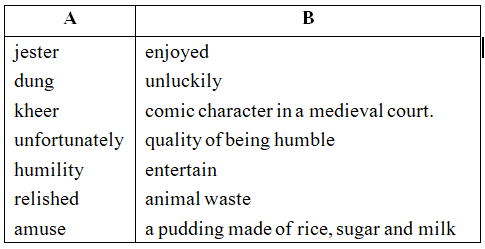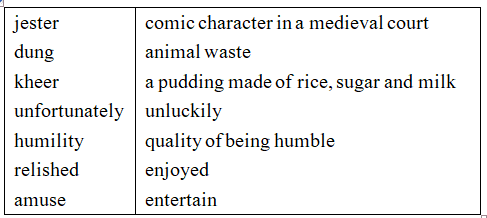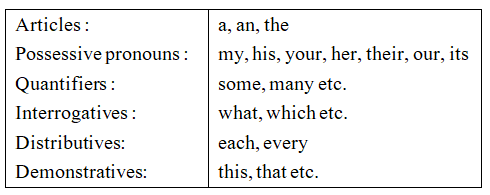Bihar Board Class 8 English Part III Chapter 3. The Raja’s Dream Text Book Questions and Answers
3. The Raja’s Dream
TEXTBOOK QUESTIONS AND THEIR ANSWERS
B. LET’S COMPREHEND :
B.1. THINK AND TELL:
Q. 1. What complaint did the courtiers make to Raja Krishna Chandra ?
Ans. The courtiers made complaint that Gopal loved to make everyone like a fool.
Q. 2. How did Krishna Chandra decide to amuse himself?
Ans. Krishna Chandra decided to amuse himself by baiting Gopal,
Q. 3. What did Raja tell Gopal ?
Ans. Raja told Gopal that he had a strange dream.
Q. 4. What were the two pools filled with in Raja’s dream?
Ans. One of the pools was filled with Kheer made of rich thick milk and the other full of horribly smelly dung.
Q. 5. In which pool did Gopal fall?
Ans. Gopal fell into the pool of rotting muck.
Q. 6. Whose dream finished earlier?
Ans. Raja’s dream finished earlier.
Q. 7. Who was licking whom in Gopal’s dream?
Ans. In Gopal’s dream, Raja was licking Gopal and Gopal was licking Raja.
B.2. THINK AND WRITE:
B.2.1. Write ‘T’ for true and ‘F’ for false statement.
1. Gopal was a great fool.
2. Raja actually had a strange dream.
3. Raja fell in the pool filled with milk.
4. The courtiers mocked at Gopal on hearing Raja’s dream.
5. Raja punished the courtiers for laughing at him.
Ans. 1. False, 2. False, 3. False, 4. True, 5. False.
B.2.2. Answer the following questions briefly :
Q. 1. What did Gopal love doing?
Ans. Gopal loved to make everyone appear like a fool.
Q. 2. What did the king think on hearing the courtiers complaint?
Ans. The king thought that the courtiers complaint was true.
Q. 3. How did the pool like in which the king fell look like?
Ans. The pool in which the king fell was looked like a pool full of kheer made of rich thick milk.
B.2.3. Answer the following question in about 70 words.
Q. 1. What happened to the people who tried to get their backs at Gopal ?
Ans. People who tried to get their backs at Gopal but always ended up looking like utter idiots.
Q. 2. What was the king’s dream? Describe.
Ans. In the king’s dream, the king and Gopal had gone for a walk. They reached a place where there were two pools: one filled with kheer made of rich thick milk and the other was full of horrible smelly dung. Suddenly the king fell into the pool of kheer and Gopal fell into the pool of rotting muck.
Q. 3. What did Gopal say on hearing the king’s dream?
Ans. Gopal said that he, too, had the same dream. There was a little difference that the king’s dream ended earlier. Gopal saw latter that both of them came out of the pool and licked each other in order to clean them.
Q. 4. Sketch the character of Gopal, the jester.
Ans. Gopal was a jester. He was a good man. He was very intelligent and witty. He did not get annoyed over. He was ready–witted. He was courageous.
Q. 5. Can you guess the King’s feeling at Gopal’s reply? What would you do if someone replied you in that manner?
Ans. The king was not pleased at Gopal’s reply, because there was an insult in it, but at that moment he was in a good mood, and so did not mind his insult.
I, too, would take it lightly if anyone replied me during such a course of amusement.
C. WORD STUDY:
C.1. Fill in the blanks in the following sentences with the words given below :

1. Gopal was a ……… in the Raja’s court.
2. Raja …….. that Gopal fell into the pool of horribly smelly ……….
3. On hearing Raja’s dream, the …….. burst out laughing.
4. Gopal had a …….. dream.
5. Gopal and the king were licking each other in order to ……….. themselves.
Ans. 1. jester, 2. dreamt, dung, 3. courtiers, 4. longer. 5. clean
C.2. Find out from the story the words which are opposites (antonyms) of the words given below :
appreciate, hated, never, thin, weep, began, pushed
Ans. complaining, loved, always, thick, laugh, end, pulled
C.3. Match the words in column A with their meanings in column B.

Ans

D. GRAMMAR :
D.1. Determiners :
Look at the following sentence:
The king was in a good mood and did not mind his legs being pulled a little.
Note the underlined words in the given sentence. Here, the word ‘the’ before ‘king’ refers to a particular king, i.e., Raja Krishna Chandra. Similarly, the word ‘his’ before ‘legs’ refers to the legs of that very king.
Words like a/an, the, this, that, some etc. are called Determiners and they are used before a noun or a noun phrase to define or limit its meaning. In a noun phrase, only one determiner is permitted. There are many determiners in English. Here is a list of some of them:

D.1. 1. Encircle determiners in the story “The Raja’s Dream’.
Ans. his, a, the, their, the, a, the (paragraph 1)
a, the, the, the, the (paragraph 2)
a, a, the, the, the (paragraph 3)
the, the, the (paragraph 4)
the, the (paragraph 5)
the, your, the (paragraph 6)
your, my, a, the (paragraph 7)
the, the, his, a, a (paragraph 8)
D.1.2. Now encircle determiners in the following sentences:
1. I don’t know where I left my shoes.
2. I am not free this afternoon.
3. Can I borrow your English book for a minute?
4. When is your birthday?
5. My father has invited his friends to my birthday party.
6. This room is bigger than that room.
7. The man who is standing at the gate is my uncle.
8. I’m busy these days.
9. I need some water.
Ans. 1. my; 2. this; 3. your, a; 4. your; 5. my, his, my; 6. this, that; 7. the, the, my; 8. these; 9. some.
D.1.3. Use of ‘each’ and ‘every’:
Look at the following sentences.
Each boy is intelligent (individually)
Every boy is intelligent (all)
We use ‘each’ and ‘every’ before singular countable nouns. We use ‘each’ before a singular countable noun when we talk about two or more people or things separately as individuals. We use ‘every’ when we talk about three or more people or things together as a group; e.g.,
Each boy and girl was given a prize.
Each of the girls was allowed to speak for two minutes.
Every boy was present in the class. All boys were present in the class.
D.1.4. Make two sentences with ‘each’ and ‘every’.
Ans. Each soldier was brave.
Each student and teacher was present in the meeting.
Every person was busy in his work.
Every thing is clear to us.
D.1.5 Pick out determiners in the following passage:
A little boy saw pictures of the most wanted criminals at the police station. Pointing at one picture he asked a policeman there, “Is he really a wanted criminal ?”
“Yes”, said the policeman. Looking puzzled, the little boy remarked.
“Then why didn’t you keep him when you took his picture?”
Ans. a, the, the, one, a, a,
the, the,
his
D.2. Punctuation Marks :
We use a variety of punctuation marks, such as full stop/period, comma, question mark, brackets etc. in our writing to separate sentences, phrases, etc., and to clarify their meaning.
Apostrophe (’)
(i) An apostrophe is used:
(a) to form contractions by showing the numbers or letters that have been left out; e.g., ’88 = 1988, I am = I’m, we are = we’re, he will = he’ll, they would = they’d, do not = don’t, I have = I’ve.
(b) to form the possessive of a noun.
Add ‘s to a single noun or name : uncle’s shop, Ashu’s friend, cat’s tail, Anu’s car.
Add ‘s to a singular noun that ends in–s :
actress’s role princess’s friend; rhincoeros’s skin.
Add ‘s to other plural nouns :
children’s toys; women’s shoes; men’s shirts.
Add ‘s to a person’s office or shop :
I’ll buy the medicine at the chemist’s / I’ll be visiting Anil’s.
Add ‘s only after the second name :
Jack and Jill’s pail, Aslam and Anuj’s school.
(c) to form the plural of abbreviations:
many Dr.’s many C.M.’s, many Ph.D.’s
(ii) An apostrophe is placed at the end of the word when the word is plural and ends in s’: students’ bags, books’ covers.
(iii) for the plural of a number or letter:
you l’s, your c’s, your 5’s are too big.
Colon (:)
(i) A colon is used before a list and usually after ‘as follows’ or ‘following items’ etc.
Example : This box contains the following items :
bandages, plasters, lotion, medicines and a pair of scissors
(ii) It is used to separate the hour from the minutes when telling time.
Example : 10:45 A.M., 10: 45 P.M.
(iii) It is used to introduce quoted material.
Example : The Headmaster of our school often used to tell us this
Quaotation : ‘Writing makes a man perfect’.
Semicolon:
A semicolon is used:
(i) to join two sentences, independent clauses or a series of items which are closely connected in meaning.
Example : He gives up smoking; obviously, he fears contracting one of the smoking-related diseases.
(ii) to join two complete sentences into a single written sentence when the two sentences are too closely related to be separately by a full stop and there is no connecting word which would require a comma such as ‘and’ or ‘but’.
Example : He had no money; he felt helpless.
(iii) to join two independent clauses when the second clause restates the first or when the two clauses are of equal emphasis.
Example : Road construction in Tarauni has hindered travel around village: streets have become covered with bulldozers, trucks. cement, etc.
(iv) to join two complete sentences into a single written sentence where the second sentence begins with a conjunctive adverb such as ‘however, nevertheless’. ‘accordingly’, ‘consequently’, or ‘instead’.
Example : I wanted to make my speech short; however, there was so much to cover.
(v) to separate items in a list when one or more of those items contains a comma.
Example : The speakers included: Radha Mohan Meena, the Commissioner; Nasiruddin Khan, the Education Officer; and Ajay Chaudhary, the Principal.
Hyphen (-) :
A hyphen is used :
(i) to join two words or more to form compound words.
Example : good–looking, pro-Indian, forty-one, daughter–in–law.
(ii) It is used for periods of time when you might otherwise use to.
Example : The years 2009-2011, September-December.
(iii) to link two connected words.
Example : the Patna-Delhi train.
(iv) to add emphasis or make it dramatic.
Example : He said that he would go–and he did.
Dash (-) :
(i) A dash is sometimes used instead of a colon or a semi-colon.
Example : “Quick! Go now the police are coming for you!”
(ii) A dash is used in pairs to separate a strong interruption from the rest of the sentence (a strong interruption, as opposed to a weak interruption, is one which forcefully disrupts the flow of the sentence and, as such, it usually contains a verb rather simply being a phrase).
Example : All nations’ desire economic growth-some even achieve it but it is easier said than done.
(iii) When dashes are used in a sentence, commas are not used to separate interrupting phrases.
Example : She looked at the dresses-a few of them-deciding on the one she should buy. (NOT: She looked at the dresses,–a few of them,–deciding on the one she should buy.)
D.2.1 Add what you think are appropriate punctuation marks to the sentences below:
1. Our neighbours dog likes to chew bones.
2. Anshus sister is a doctor in Apollo Hospital.
3. Last week we read The Catbird Seat a short story by James Thurber.
4. Our three children Anu, Anil and Aniket like playing cricket.
5. In three weeks time well have to begin school again.
6. Doesnt she know that we dont drink coffee.
7. Its important that the puppy learns to find its way home.
8. She did not hear her childrens cries.
9. My friend’s name has two As
10. The man whose face was white said that he had spent his two weeks vacation in Sikkim.
11. No the taxi driver said politely I cannot take your to the airport in fifteen minutes.
12. Anwesha is trying hard in school this semester her father said.
13. When did Roosevelt say We have nothing to fear but fear itself.
14. There was only one thing to do study till dawn.
15. The following are the primary colours red blue and yellow.
16. We reached home at 1015 AM.
17. We had a great time in Delhi the kids really enjoyed it.
18. Some people work best in the mornings others do better in the evenings.
19. The girls father sat in a corner.
Ans.
1. Our neighbour’s dog likes to chew bones.
2. Anshu’s sister is a doctor in Apollo hospitals.
3. Last week, we read ‘The Catbird Seat’, a short story by James Thurber,
4. Our three children-Anu, Anil and Aniket, like playing cricket.
5. In three week’s time, we’ll have to begin school again.
6. Doesn’t she know that we don’t drink coffee.
7. It’s important that the puppy learns to find its way home.
8. She did not hear her children’s cries.
9. My friend’s name has two A’s.
10. The man whose face was white, said that he had spent his tw weeks vacation in Sikkim.
11. No, said the taxi driver politely, “I cannot take you to the airpo in fifteen minutes.”
12. “Anwesha is trying hard in school this semester”, her father said
13. When did Roosevelt say: “We have nothing to fear but fear itself.
14. There was only one thing to do: study till down.
15. The following are the primary colours: red, blue and yellow.
16. We reached home at 10: 15 A.M.
17. We had a great time in Delhi, the kids really enjoyed it.
18. Some people work best in the mornings, others do better in th evenings.
19. The girl’s father sat in a corner.
E. LET’S TALK:
Q. Work in groups and discuss the following
“It’s not right to mock at others.”
Ans.
Anil : Is it right to mock at others?
Ritesh : No, it is not right to mock at others.
Hori : What do you feel; if anybody mock at you, Kabir ?
Kabir : I don’t take it otherwise, if anyone mock at me. But, think some persons take it badly and quarrel amongs themselves.
Anil : Well, so we should not mock at others, if we are no friends.
F. COMPOSITION:
Q. Write a paragraph on either of the following topics:
1. Pleasures of having fun at others.
2. There is no life without humour.
Ans. 1. Pleasure of Having Fun at Others
Many people take pleasure of having fun at others. They do not f their humiliation. People who are humble tolerate the fun but sometimes some people reacts very violently. This causes a great tumult in the society and begets much harm. Though, to have a fun among friends to get amusement is a good thing which passes our time during leisure. It refreshes our mind and relax our body. So, pleasure of having fun is useful among friends.
2. There is No Life without Humour
Man is not a body of machine. A working man needs some leisure, some break, some rest to work in further hours. In due course, he also needs some amusement to refresh his mind. We know that human mind is very powerful, but it cannot work continuously. So sometimes, during leisure we need humour to activate our mind. Otherwise, it will go nervous and cannot work in further hours. So, without humour in our life, we cannot continue actively.
G. TRANSLATION :
Write a summary of the lesson and then translate into Hindi/Urdu.
Hints : See the ‘Summary of the Lesson’ on pages 23 and 24.
SOME OTHER IMPORTANT QUESTIONS WITH ANSWERS
Q. 1. Who was Gopal ?
Ans. Gopal was a jester in the court of Raja Krishna Chandra.
Q. 2. What was the reaction of Raja Krishna Chandra at the complaint of the courtiers?
Ans. Raja Krishna Chandra decided to amuse himself by baiting Gopal.
Q. 3. Was Raja Krishna Chandra amused by baiting Gopal ?
Ans. Yes. Raja Krishna Chandra was much amused by baiting Gopal and had a good laugh at Gopal’s wit.
Q. 4. Were both the dreams in the story. The Raja’s Dream, same?
Ans. Yes, both the dreams were same, but one was shorter and the other was longer.
Q. 5. Why did Raja Krishna Chandra considered the courtiers complaint true?
Ans. If often rankled the king that without uttering a single objectionable word Gopal made him feel silly more than once. So, he considered the courtiers complaint true.
Read more – Click here
YouTube Video – Click here
Leave a Reply